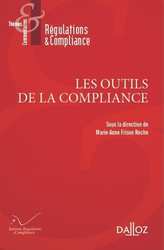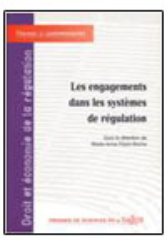Thesaurus : Doctrine
Compliance and Regulation Law bilingual Dictionnary

The liberal professions such as lawyers, doctors or accountants are organized into professional bodies and consider that they can not be reduced to mere companies operating in markets because the service they offer includes a human and moral dimension, translated by ethics, under the supervision of their internal professional organization, particularly through ex ante their power to adopt their own standards of behavior, and in ex post, the disciplinary power of their professional order.
Competition law refutes this organization from the Old Regime and simply considers the "markets of legal or medical services, firms having to compete with each other and not having to organize the sector, by or fixing Numerus clausus, etc.
In the perspective of regulation, the liberal professions are, on the contrary, the ones most pertinento organize self-regulation in a globalized economy from the moment they give rise to a credible surveillance system and thus deserve the confidence of customers and public regulators.
Sept. 4, 2025
Publications

🌐follow Marie-Anne Frison-Roche on LinkedIn
🌐subscribe to the Newsletter MAFR Regulation, Compliance, Law
🌐subscribe to the Video Newsletter MAFR Surplomb
____
► Full Reference: M.-A. Frison-Roche, "Le droit processuel, prototype de l'Obligation de Compliance " ("General Procedural Law, prototype of Compliance Obligation"), in M.-A. Frison-Roche (ed.), L'Obligation de Compliance, Journal of Regulation & Compliance (JoRC) and Dalloz, coll. "Régulations & Compliance" 2025, to be published.
____
📝read the article (in French)
____
🚧read the bilingual Working Paper on the basis this contribution has been built, with more developments, technical references and hyperlinks.
____
📕read a general presentation of the book, L'Obligation de Compliance, in which this article is published
____
► English summary of this contribution : At first glance, General Procedural Law seems to be the area least concerned by the Compliance Obligation, because if the person is obliged by it, mainly large companies, it is precisely, thanks to this Ex Ante, in order to never to have to deal with proceedings, these path that leads to the Judge, that Ex Post figure that in return for the weight of the compliance obligation they have been promised they will never see: any prospect of proceedings would be seeming to signify the very failure of the Compliance Obligation (I).
But not only are the legal rules attached to the Procedure necessary because the Judge is involved, and increasingly so, in compliance mechanisms, but they are also rules of General Procedural Law and not a juxtaposition of civil procedure, criminal procedure, administrative procedure, etc., because the Compliance Obligation itself is not confined either to civil procedure or to criminal procedure, to administrative procedure, etc., which in practice gives primacy to what brings them all together: General Procedural Law (II).
In addition to what might be called the "negative" presence of General Procedural Law, there is also a positive reason, because General Procedural Law is the prototype for "Systemic Compliance Litigation", and in particular for the most advanced aspect of this, namely the duty of vigilance (III). In particular, it governs the actions that can be brought before the Courts (IV), and the principles around which proceedings are conducted, with an increased opposition between the adversarial principle, which marries the Compliance Obligation, since both reflect the principle of Information, and the rights of the defence, which do not necessarily serve them, a clash that will pose a procedural difficulty in principle (V).
Finally, and this "prototype" status is even more justified, because Compliance Law has given companies jurisdiction over the way in which they implement their legal Compliance Obligations, it is by respecting and relying on the principles of General Procedural Law that this must be done, in particular through not only sanctions but also internal investigations (VI).
Mais non seulement les règles juridiques attachées à la procédure s'imposent parce que le Juge s'avère présent, et de plus en plus, dans les mécanismes de compliance mais encore ce sont des règles de Droit processuel et non pas une juxtaposition de procédure civile, procédure pénale, procédure administrative, etc., parce que l'obligation de compliance elle-même n'est pas enfermée ni dans le droit civil, ni dans le droit pénal ,dans le contentieux administratif, etc., ce qui donne en pratique primauté à ce qui les réunit toutes : le Droit processuel (II).
A cette raison que l'on pourrait dire "négative" de la présence du Droit processuel s'ajoute une raison positive, parce que le Droit processuel s'avère être le prototype du "Contentieux systémique de la Compliance, et notamment de la pointe avancée de celui-ci qu'est l'obligation de vigilance (III). Il gouverne notamment les actions par lesquelles les Juges peuvent être saisis (IV), les principes autour desquels les procédures se déroulent, avec une opposition accrue entre le principe du contradictoire qui épouse l'obligation de compliance puisque l'un et l'autre traduisent le principe d'information et les droits de la défense qui ne les servent pas nécessairement, heurt qui va poser une difficulté processuelle de principe (V).
Enfin, et la qualité de "prototype" se justifie alors plus encore, parce que le Droit de la compliance a juridictionnalisé les entreprises dans la façon dont celles-ci mettent en oeuvre leurs Obligation légale de Compliance, c'est en respectant et en s'appuyant sur les principes de droit processuel que cela doit être fait, notamment à travers non seulement les sanctions mais encore les enquêtes internes (VI).
________
Feb. 2, 2023
Thesaurus : Doctrine

► Full Reference: A. Bruneau, "L'entreprise juge d'elle-même : la fonction compliance dans la banque" ("The company judge of itself: the compliance function inside the bank"), in M.-A. Frison-Roche (ed.), La juridictionnalisation de la Compliance, coll. "Régulations & Compliance", Journal of Regulation & Compliance (JoRC) and Dalloz, 2023, p. 115-131.
____
📕read a general presentation of the book, La juridictionnalisation de la Compliance, in which this article is published
____
► Summary of the article (done by the author): First of all, it should be remembered that the compliance function was born within finance, and that by being structured, it has evolved to support the transition from regulatory law to compliance law. Through these changes, compliance has gone from an ex-post controlling function to an ex-ante binding function. The LIBOR crisis imperfectly illustrates the primacy of this transition. The evolution of this role is illustrated by concrete examples
Firstly, the management of reputational risk is a fundamental part of the company as prosecutor and judge of itself. Reputational risk is a significant element for a financial institution, because it can have negative consequences on its capitalization, or even culminate in a systemic crisis. Avoiding a large-scale financial crisis is also part of the monumental goals of compliance.
In order to avoid complex and inopportune scenarios, compliance law intervenes as early as possible and identifies issues that may impact reputation. The regulations require the implementation of certain ex ante mechanisms. The French law known as "Sapin 2" requires the implementation of tools that concern all companies (and not just banks). Indeed, beyond the risk of reputation, it is essential to consider the risk of corruption. Consideration of reputational risk may justify refusing to execute certain transactions. From this perspective, compliance must assess the potential consequences of entering into a relationship with a new client upstream, sometimes to decline the provision of services. The compliance function therefore unilaterally judges the relationship with a view to managing the company reputational risk.
Secondly, the internal sanction mechanism established by compliance law is also discussed in this article, in particular the internal sanctions adopted by compliance in a financial institution.
Compliance can act as a prosecutor via management committees set up within the business lines. In addition, compliance can determine and apply sanctions against employees. In this way, there is a dual role of prosecutor and judge for the compliance function within the framework of an extraordinary mechanism of ordinary law.
Finally, the analysis deals with the case of the "judge-judged": following a decision by the bank, the regulator may take an even stricter position by believing that the bank is applying its guidelines incorrectly. Thus, the compliance law, which takes hold within the banking enterprise, finds itself under the judgment of its own regulator. The company finds itself judged and comes to be a prosecutor and judge of itself, but also of its clients.
__________
April 21, 2021
Thesaurus : Doctrine

► Full Reference : Th. Amico, "La Compliance ou le passage de l'ex post à l'ex ante. Une révolution copernicienne pour l'avocat pénaliste ?" ("Compliance or the passage from ex post to ex ante: a Compernican revolution for the criminal lawyer?"), in M.-A. Frison-Roche (ed.), Les outils de la Compliance, coll. "Régulations & Compliance", Journal of Regulation & Compliance (JoRC) and Dalloz, 2021, p. 145-154.
____
📕read a general presentation of the book, Les outils de la Compliance, in which this article is published
____
► Summary of the article (done by the Journal of Regulation & Compliance): After referring to various definitions of Compliance Law, the author insists on the usefulness of the criminal lawyer in that he, familiar with the Ex-Post that constitutes the sanction, can be of good advice. in the Ex-Ante in which new compliance mechanisms are being developed, such as risk mapping or third-party assessment.
Addressing the punitive dimension of Compliance Law, the author shows that the criminal lawyer therefore naturally has a place there, whether it concerns the powers exercised by an administrative authority or the criminal law itself. In that he can "anticipate criminal proceedings", the criminal lawyer is therefore best able to ensure that the company does not expose itself to them, in particular in a good mastery of internal investigations, thus ruling out the criminal risk.
________
Aug. 11, 2020
Newsletter MAFR - Law, Compliance, Regulation

Full reference: Frison-Roche, M.-A., Against money laundering, what time matters? Does it work, between ExAnte and ExPost? (BIL case), Newsletter MAFR - Law, Compliance, Regulation, 11th of August 2020
Read, by freely subscribing, the other news in the Newsletter MAFR - Law, Compliance, Regulation
Summary of the news
The activity of money laundering is detrimental not only in itself but also because it permits the development and the sustainability of other criminal activities such as drug trafficking, weapon trafficking or human beings selling. Fighting against money laundering could permit to indirectly fight against these underlying activities, by the way very difficult to fight. Thus, the fight against money laundering has become a "monumental goal", which justifies the adoption of tools sometimes much more powerful than those used by classical criminal Law. For the sake of efficiency, the legal obligation to prevent money laundering is given to every body able to do it, as banks, real estate agents or gaming society, under the penalty of sanction.
On 10th of August 2020, the Luxembourgish financial market supervisor convicts the International Bank of Luxembourg to pay a fine of 4,5 millions of euros because of weaknesses detected in its process of fight against money laundering. However, when the sanction has been pronounced, the bank had already remedied the weaknesses identified. It is important to observe that what is important for Compliance Law, it is not that a non compliant behavior is punished but rather that the crucial firm modifies its behavior in order to being more efficient in the realization of the "monumental goal", only concern of the public authority. Thus, an Ex Post sanction against the crucial operator is not an end in itself and can be justified only if it permits to incite the crucial operator to act or rather to desincite to do anything. Compliance Law is an Ex Ante legal system.
To go further, read:
- Frison-Roche, M.-A., Le couple Ex Ante - Ex Post, justificatif d'un droit spécifique et propre de la Régulation, 2006 (in French)
Oct. 22, 2010
Publications

► Référence complète : M.-A. Frison-Roche, " Ex ante - ex post, justicacion de un derecho proprio y especifico de la regulacion", Revista de Responsabilidad civil y seguros, pp.3-13, LA LEY ed., 2010.
____
► Résumé en français de l'article (rédigé en espagnol) : L'analyse économique du droit utilise très fréquemment la distinction "ex ante/ex post " pour opposer le droit qui intervient avant que la situation ou la difficulté ou le fait générateur n’advienne, alors que l’ex post désigne une intervention juridique une fois que ceux-ci sont constitués. C’est pourquoi on affirme souvent que la Régulation est ex ante alors que le droit de la concurrence est ex post. Mais c’est réduire la Régulation à la réglementation qui seule est ex ante, alors que le régulateur dispose de nombreux pouvoirs ex post. En outre, par le mécanisme de la jurisprudence et les stratégies anticipatrices des agents économiques, toute décision ex post constitue un "ex ante cognitif". Cet article, écrit en espagnol, reprend la démonstration pour montrer la dialectique entre l’ex ante et l’ex post, dont les rapports entre l’assurance, mécanisme justifié parce que l’agent sait qu’il peut être responsable (ex ante cognitif), et la responsabilité civile, sont le meilleur exemple. C’est pourquoi les régulateurs utilisent toujours les mécanismes de responsabilité.
____
Accéder à l'article publié en langue française.
________
March 11, 2006
Publications

Référence complète : FRISON-ROCHE, Marie-Anne, Le couple Ex Ante – Ex Post, justificatif d’un droit spécifique et propre de la régulation, in Les engagements dans les systèmes de régulations, coll. "Droit et Économie de la Régulation", vol.4, Presses de Sciences-Po / Dalloz, 2006, pp. 33-48.
L’analyse économique du droit utilise très fréquemment la distinction "ex ante/ex post " pour opposer le droit qui intervient avant que la situation ou la difficulté ou le fait générateur n’adviennent, alors que l’ex post désigne une intervention juridique une fois que ceux-ci sont constitués. C’est pourquoi on affirme souvent que la Régulation est ex ante alors que le droit de la concurrence est ex post. Mais c’est réduire la Régulation à la réglementation qui seule est ex ante, alors que le régulateur dispose de nombreux pouvoirs ex post. En outre, par le mécanisme de la jurisprudence et les stratégies anticipatrices des agents économiques, toute décision ex post constitue un "ex ante cognitif". Cela correspond à un mode rhétorique de la régulation, qui se construit sur un modèle circulaire que le rapport linéaire entre l’ex ante et l’ex post restitue mal.
Lire la présentation générale de l'ouvrage dans lequel l'article a été publié.
Accéder à l'article lors de la parution en langue espagnole.
Lire ci-dessous le résumé de l'article.